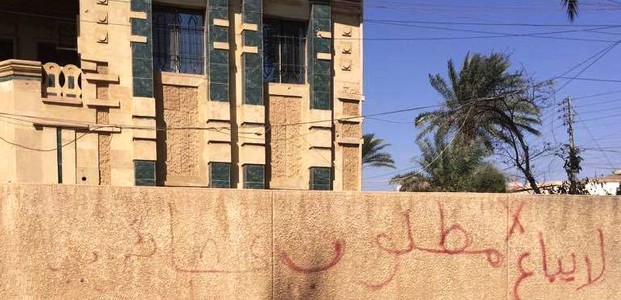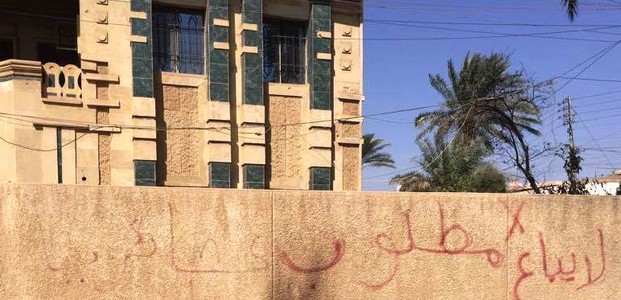Kamal al-Ayash | Anbar | (Niqash.org) | – –
In Ramadi, tribes are marking houses belonging to suspected Islamic State [group] collaborators with special graffiti. Often the houses are demolished two or three days later. But the tribes can also get it wrong.
Graffiti on walls in Ramadi calling for tribal justice. (photo: Kamal al-Ayash)
The extremist group known as the Islamic State [group] [IS] were driven out of the central Iraqi city of Ramadi earlier this year. And residents have started to return. Now the slogan that was once daubed on many houses and buildings in the city – the one that says “waqf [or property] of the [IS]” – is being removed. Instead there is another frightening slogan being painted on Ramadi walls: “Wanted, by tribal justice”. Usually it is large and noticeable and written in red.
What this means is that the somebody attached to this building – possibly a member of a family or the building owner or similar – is wanted under the auspices of tribal justice, and most likely because they are suspected of joining or supporting the extremist . . . IS group.
The locals of Anbar province, of which Ramadi is the capital, have always emphasised tribal justice, especially in times of trouble. Tribal justice has long been a problem in Iraq, when the regular justice system is not trusted, with locals bypassing the court system and having tribal elders mete out justice, often in the form of financial reparations. Indeed, when there doesn’t appear to be enough evidence to convict a possible criminal in court, locals will turn to their tribal elders for justice. These have their own methods of investigating wrong doing and those cases often start with the red slogan scrawled on the alleged criminal’s wall.
Local man, Abu Amir, who did not want to give his full name for security reasons, says he was shocked to return to Ramadi and find that this phrase was written on the house belonging to his son-in-law, which is near his own home.
“They come in the evening to write on the walls. Then we know that the house will be destroyed in two or three days.”
“We used all of our contacts and approached the security forces as well as prominent locals and senior tribal figures to try and resolve this,” the Ramadi local, in his 60s, says. “But there was nothing we could do.”
Abu Amir says his son-in-law and daughter have not been able to return to Ramadi because of the slogan. He himself stayed away from the house and did not dare enter it because he knew that the people who wrote the slogans often watch the buildings very carefully. When such a slogan is written on the wall of a house, it becomes a “restricted area”, he says, and often the security forces manning checkpoints around the building are also keeping an eye on any comings and goings.
One day recently Abu Amir says he woke up to the sound of an almighty explosion. At first he thought it was an improvised explosive device left behind by the IS group. “But when the dust settled we realised it was retribution. The tribe had blown up the house of my daughter and her husband,” Abu Amir recounts. “That was the day I realized I would never be able to hug my own grandchildren in this city again. Since then I’ve been trying to sell my house here and meet my only daughter and her family elsewhere, either in another part of Iraq or maybe in another country.”
Tribal justice is common in Iraq as is the slogan. But in Ramadi in recent times tribal justice hasn’t been about reparations or an end to family feuds; everyone knows that today the slogan means retribution for an alleged alliance with the IS group.
“In the past we knew about the slogans for tribal justice,” Omar al-Rawi, a resident of the Tamim neighbourhood in Ramadi, says. “We knew who wrote them and we knew why. Mostly the purpose was financial retribution. But today things are different. In the evening when the curfew starts these phrases start appearing on walls. They are being put there by the tribes with power and weapons.”
Al-Rawi has become a victim of the sloganeers too. About 15 days ago, the 53-year-old left for work and found that the same phrase had been scrawled on the walls of his home. He went back inside and his family quickly packed their bags and moved to a safer house; they haven’t been back home since.
“It’s all because of my neighbour, Abu Aws, who used to work as a blacksmith,” al-Rawi told NIQASH. “Rumour has it he was working for the IS group. Then the same thing turned up on my house. We are staying away until we can solve this problem somehow. Our house could be bombed at any time.”
Tribal justice
Locals suspect collusion between the security forces and those who paint the slogans.
“There are dozens of houses with this slogan on in our neighbourhood,” says Saad al-Bilawi, a local living in the Shurta neighbourhood in central Ramadi. “We also see other graffiti that says things like ‘blood wanted’ or ‘wanted by the tribes’. Sometimes there is just an ‘X’ to indicate that the owner of the house is wanted.”
Al-Bilawi says he and his neighbours believe that the people who are writing the slogans are getting help from the security forces positioned around Ramadi. “We haven’t seen anyone actually writing the graffiti,” al-Bilawi says. “They come in the evening. And then after a house is written on, we know that the house will be destroyed in two or three days.”
The provincial authorities are well aware that tribal justice like this, is becoming a problem. “This kind of martial law implemented by the tribes has become much more widespread since the end of military operations here, as families have returned to their homes,” says Rajeh Barakat al-Issawi, a local politician who heads Anbar’s provincial security committee. “This is not because the judiciary is weak in Anbar,” he argues. “It is because there is direct contact between the families of those accused of terrorism and the victims of terrorism. They all know one another.”
Al-Issawi says that the local authorities have been arranging meetings with various tribal elders to try and limit this form of martial law.
Having said that, Mahmoud al-Rishawi, a member of Anbar’s council of tribal leaders, told NIQASH that the senior members of various tribes had decided that the families of those associated with, or belonging to, the IS group had no place in the province right now. Blood had been spilled and until it was possible to identify exactly who was an IS member and who was not, families needed to abandon any members who had been involved with the extremists.
“Nobody knows how many houses in the province have inhabitants who are wanted by tribal justice,” al-Rishawi said. “Often if somebody has lost a father or a brother, or if a person has been harmed, he will get a lot of support from members of his tribe when it comes to seeking justice.”
For example, al-Rishawi continues, “there are small villages to the north and east of Ramadi where many inhabitants have been forced to leave. They were accused of hosting the IS group and now they are paying for it.”
Via Niqash.com




 © 2025 All Rights Reserved
© 2025 All Rights Reserved